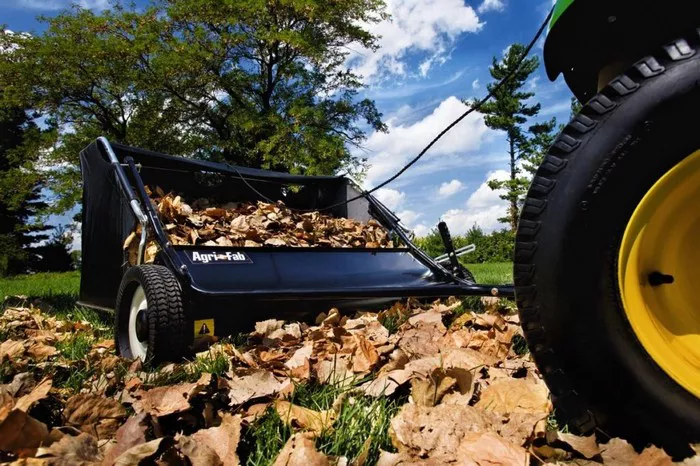Lawn maintenance is an essential aspect of homeownership, and one of the tasks that often accompanies it is dealing with grass clippings. While some opt for leaving clippings on the lawn as natural fertilizer, others prefer to remove them for aesthetic reasons or to prevent thatch buildup. Lawn sweepers are a popular tool for this purpose, but do they effectively handle grass clippings? This guide aims to provide a comprehensive answer to this question, exploring how lawn sweepers work on grass clippings and offering insights into their effectiveness.
Understanding Lawn Sweepers
Lawn sweepers are mechanical devices designed to clear debris, such as leaves, grass clippings, and other lawn debris, from the surface of the lawn. They typically consist of a rotating brush or brushes attached to a wheeled frame, which is either pushed or towed behind a lawn tractor or riding mower. As the sweeper moves over the lawn, the rotating brushes pick up debris and deposit it into a hopper or bag for easy disposal.
How Lawn Sweepers Work on Grass Clippings
Lawn sweepers are specifically designed to collect grass clippings, making them an efficient tool for post-mowing cleanup. The rotating brushes of the sweeper comb through the grass, lifting and collecting clippings as they move. The height of the brushes can often be adjusted to accommodate varying grass heights, ensuring thorough coverage and collection.
Additionally, lawn sweepers are equipped with a hopper or bag attachment to contain the collected clippings. This allows users to easily empty the debris once the hopper is full, preventing it from accumulating on the lawn.
Factors Affecting Effectiveness
While lawn sweepers are generally effective at collecting grass clippings, several factors can influence their performance:
1. Grass Length: Lawn sweepers work best on shorter grass, as longer grass may be more difficult for the brushes to reach and collect effectively. It is advisable to mow the lawn regularly to maintain an optimal grass height for efficient sweeping.
2. Sweeper Size and Design: The size and design of the lawn sweeper can impact its effectiveness. Larger sweepers with wider brush spans can cover more ground in less time, while certain designs may be better suited for specific lawn conditions, such as uneven terrain or obstacles.
3. Terrain and Obstacles: Uneven terrain or obstacles such as rocks, tree roots, or landscaping features can affect the performance of a lawn sweeper. It is essential to maneuver the sweeper carefully to avoid damage and ensure thorough coverage.
4. Maintenance: Regular maintenance, including cleaning and adjusting the sweeper components as needed, is crucial for optimal performance. Ensuring that brushes are free from debris buildup and properly adjusted will help maintain effective grass clipping collection.
Conclusion
In conclusion, lawn sweepers are effective tools for collecting grass clippings and maintaining a tidy lawn. Their rotating brushes efficiently comb through the grass, lifting and collecting clippings as they move. Factors such as grass length, sweeper size and design, terrain, and maintenance can influence their effectiveness. By considering these factors and using lawn sweepers correctly, homeowners can achieve efficient grass clipping cleanup and maintain a healthy, attractive lawn.
FAQs
Q1: Can lawn sweepers handle wet grass clippings effectively?
A1: While lawn sweepers can handle wet grass clippings to some extent, it is generally advisable to wait until the grass is dry for optimal performance. Wet clippings may clump together, making them more challenging for the sweeper brushes to collect efficiently. If unavoidable, using a higher brush setting and periodically cleaning the brushes during operation can help improve collection effectiveness.
Q2: Are lawn sweepers suitable for large lawns?
A2: Yes, lawn sweepers are suitable for both small and large lawns. However, for larger lawns, it may be more efficient to use a larger sweeper with a wider brush span to cover more ground in less time. Additionally, tow-behind sweepers that can be attached to a lawn tractor or riding mower are ideal for large lawn areas, as they allow for faster cleanup and reduced manual effort.
Q3: Can lawn sweepers pick up other debris besides grass clippings?
A3: Yes, lawn sweepers are versatile tools capable of picking up various types of debris besides grass clippings, including leaves, twigs, and small branches. However, it is essential to consider the size and design of the sweeper, as well as the type of debris being collected, to ensure optimal performance. Regular maintenance and cleaning of the sweeper components will also help prevent clogs and maintain effectiveness.

